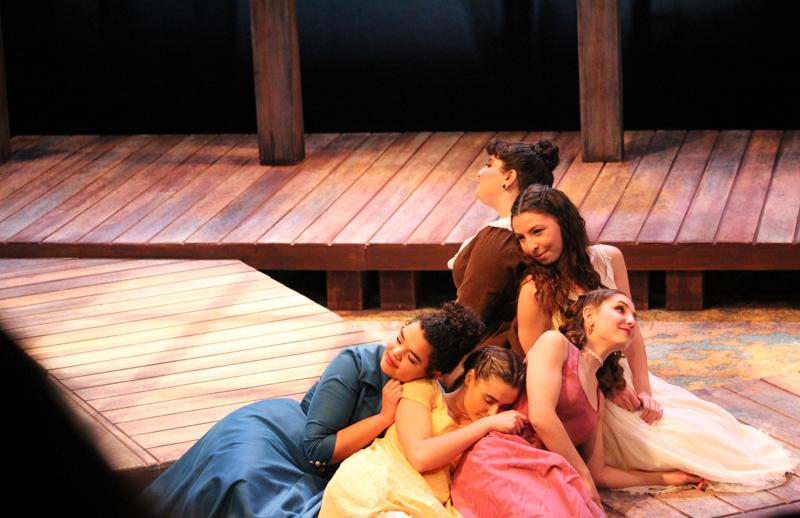First Love, Then Alienation in Tolstoy Production
Photo by Kellianne Doyle, staff photographer
College first-year Abby Bordin as Violet, double-degree junior Amy Weintraub as Masha, College sophomore Chandler Browne as Márya Aleksándrovna, College sophomore Zoe Kushlefsky as Kátya and College first-year Magda Demetriadou as Sónya perform in Leo Tolstoy’s Family Happiness. The play ran in Hall Auditorium Feb. 4–7.
February 12, 2016
One might expect the play Family Happiness, based on a novella by Leo Tolstoy, to iclude period costumes, cherry orchards and classic dacha drama, but the empty Hall Auditorium stage immediately suggested this would not be the case. A minimal layout of platforms and columns graced the floor, while two floor-to-ceiling curtains hung in the background. In the program, each role was described the same way — “Masha’s younger sister … also Masha,” or “Masha’s governess … also Masha.” It was clear that this adaptation, directed and devised by Alexis Macnab, OC ’01, and performed Feb. 4–7, would do things differently.
Tolstoy’s early novella follows Masha, a young girl who falls in love with her much older guardian, Sergey Mikhaylych, after her mother’s death. Their hesitant courtship becomes a passionate love, but once they move to Sergey’s family home, Masha grows dissatisfied and bored. So that she might experience city life, the two spend a season in St. Petersburg, where, to Sergey’s chagrin, Masha is swept up in the rush of high society. She loves balls and the attention of suitors, while he longs to return to their simple life in the country. They grow estranged and bitter as their resentment bubbles over in the line from which the book derives its title, delivered with acid precision in this play by College sophomore Jessica Toltzis as Sergey.
Macnab is no stranger to experimental takes on classic literature. She has previously adapted works by Henry James and Vladimir Nabokov, as well as The Odyssey, at California Institute of the Arts and the Edinburgh Fringe Festival. In adapting this work to the stage, Macnab focused on how love and experience transform the main character. Each actress in the production voiced some part of the role: College first-year Abby Bordin played the young and innocent Masha before passing the baton to double-degree junior Amy Weintraub for her marriage and debut in society, then to College sophomore Chandler Browne as she matured. Even Sergey Mikhaylych started as one of Masha’s voices, becoming a separate character only when Toltzis symbolically put on her costume.
Onstage for the full performance, the cast meshed well. Masha’s selves sometimes flocked around her to comfort or advise her, while at othe times they operated her and Sergey like mannequins, pushing the two together or restraining them in their love or anger. In one particularly beautiful scene, the two curtains were pulled crosswise to create the image of a garden wall, where Sergey leaned, tensely separated from Masha and unable to express his feelings. The cast was energetic, at times even frenzied, racing around the stage in excitement, anger or ecstasy. The choreography incorporated hints of a waltz and a controlled, almost eerie ballet. The show certainly lived up to its “visual and kinetic” billing.
Despite its minimal set, the play did start to feel conceptually crowded at points. The heavy symbolism that fell on the hat stand, which stood center stage as the play began and did not reappear until the very end in a refrain, felt somewhat forced. The decision to have an actress play Sergey and depict him as an emergent part of Masha was intriguing, but suggested a gender exploration that never came to fruition.
Even with a few incongruous elements, Macnab’s final product expanded meaningfully on Tolstoy’s vision in her own style. Each member of the cast performed well in their individual role and as part of an ensemble. Tense and tender, this play told a coming-of-age story that acknowledged how fractured we are even when we think we’re finally grown.
















